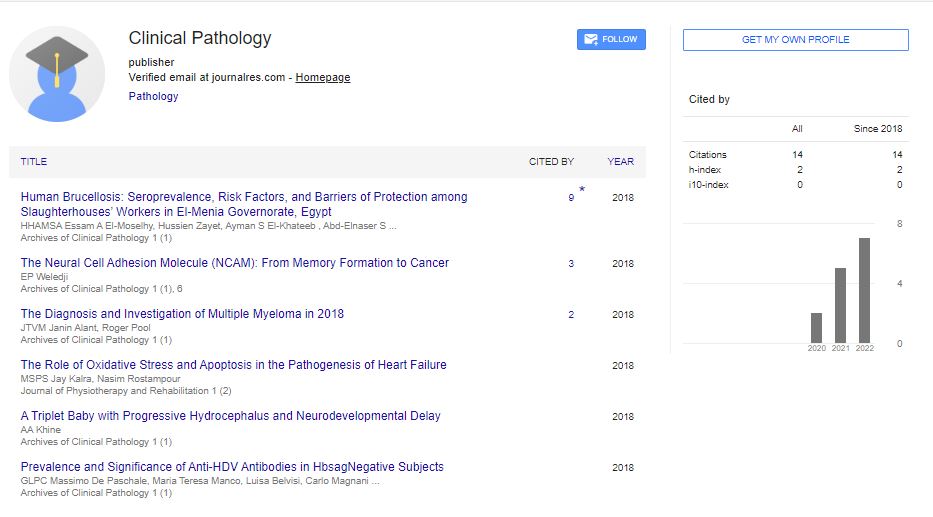Opinion Article, Arch Clin Pathol Vol: 8 Issue: 1
Effects of Clinical Virology on World Health
Toyoda Parikh*
Department of Gastroenterology, Hosei University, Chiyoda City Japan
*Corresponding Author: Toyoda Parikh
Department of Gastroenterology, Hosei
University, Chiyoda City Japan
E-mail: pari.toyo@hu.jp
Received date: 28 May, 2023, Manuscript No. ACPY-23-107047
Editor assigned date: 31 May, 2023, Pre QC No. ACPY-23-107047 (PQ);
Reviewed date: 14 June, 2023, QC No. ACPY-23-107047
Revised date: 22 June, 2023, Manuscript No. ACPY-23-107047 (R);
Published date: 28 June, 2023, DOI: 2324-8955/acpy.05.03.100083
Citation: Parikh T (2023) Effects of Clinical Virology on World Health. Arch Clin Pathol 6:2.
Description
Clinical virology plays an essential role in safeguarding world health by studying the impact, transmission, diagnosis, and management of viral infections. Viral diseases have had significant effects on global populations throughout history, from pandemics such as influenza and HIV/AIDS to emerging viral outbreaks like SARS-CoV- 2. Understanding the effects of clinical virology on world health involves examining the contributions of this field in disease surveillance, outbreak investigation, diagnosis, treatment, and prevention.
One of the key effects of clinical virology on world health is its role in disease surveillance and monitoring. Virologists work closely with public health agencies to identify and track viral infections, providing dire information for disease control and prevention strategies. Through monitoring viral trends, clinical virologists can detect outbreaks, determine the spread of viruses, and assess the effectiveness of interventions. By providing timely and accurate data, clinical virology helps inform public health policies and interventions on a global scale.
In addition to surveillance, clinical virology plays a pivotal role in the diagnosis of viral infections. Virologists utilize a range of diagnostic techniques, including molecular testing, serology, and viral culture, to identify and characterize viral pathogens. Accurate and timely diagnosis is essential for appropriate patient management, implementation of infection control measures, and containment of outbreaks. Clinical virology laboratories are responsible for performing these diagnostic tests and providing healthcare professionals with essential information for guiding patient care.
Clinical virology also contributes significantly to the development of antiviral therapies and vaccines. By studying viral replication mechanisms, resistance patterns, and host-virus interactions, virologists play a vital role in the discovery and development of antiviral drugs. Their research contributes to the design of effective treatment regimens that target specific viral pathways, minimizing viral replication and reducing the severity and duration of infections. Additionally, clinical virology is instrumental in vaccine development, including the identification of vaccine targets, testing vaccine efficacy, and monitoring vaccine safety.
The impact of clinical virology on world health is particularly evident during viral outbreaks and pandemics. Virologists are at the forefront of investigating and understanding the etiology, transmission dynamics, and clinical manifestations of emerging viruses. They contribute to the development of diagnostic tests to detect new viruses, characterize their genetic sequences, and monitor their evolution. Through their research and collaboration with public health agencies, clinical virologists provide dire information to guide public health responses, implement control measures, and develop strategies for vaccine development and distribution.
Furthermore, clinical virology has a profound influence on global health by enhancing our understanding of viral pathogenesis and the factors influencing disease outcomes. By studying host-virus interactions, immunological responses, and viral tropism, virologists identify factors that contribute to disease severity and transmission. This knowledge helps in risk stratification, predicting disease outcomes, and implementing targeted interventions. Clinical virology also contributes to our understanding of viral co-infections, drug resistance, and the long-term consequences of viral infections, aiding in the development of comprehensive management strategies.
In summary, clinical virology has wide-ranging effects on world health. It provides dire information for disease surveillance, outbreak investigation, diagnosis, treatment, and prevention of viral infections. By studying the impact of viral diseases, identifying new viruses, developing diagnostic tests, and contributing to the development of antiviral therapies and vaccines, clinical virology plays a vital role in safeguarding global health. Its contributions are essential for the control, management, and mitigation of viral outbreaks, helping to protect populations worldwide from the devastating effects of viral infections.
 Spanish
Spanish  Chinese
Chinese  Russian
Russian  German
German  French
French  Japanese
Japanese  Portuguese
Portuguese  Hindi
Hindi 